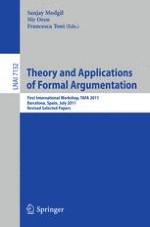This book constitutes the thoroughly refereed proceedings of the First International Workshop on the Theory and Applications of Formal Argumentation, TAFA 2011, held in Barcelona, Spain, in Juli 2011, as a workshop at IJCAI 2011, the 22nd International Joint Conference on Artificial Intelligence. The 9 revised full papers presented together with 8 revised poster papers were carefully selected during two rounds of reviewing and improvement from 32 initial submissions. The workshop promotes and fosters uptake of argumentation as a viable AI paradigm with wide ranging application, and provides a forum for further development of ideas and the initiation of new and innovative collaborations. The papers cover the following topics: properties of formal models of argumentation; instantiations of abstract argumentation frameworks; relationships among different argumentation frameworks; practical applications of formal models of argumentation; argumentation and other artificial intelligence techniques; evaluation of formal models of argumentation; validation and evaluation of applications of argumentation.
